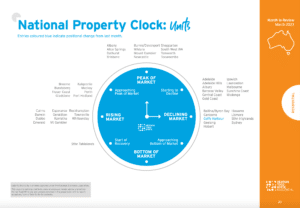Getting to know the Property Cycle
Apr 13, 2023
Understanding property cycles can be an insightful piece of knowledge when looking to buy/sell, or for when evaluating the market. So what is the property market cycle?
The property market cycle contains four stages, as follows:
- Bottom of Market
- Rising Market
- Peak of Market
- Declining Market
Commbank provides a good summary on what this looks like in action –
“While Australian property prices have risen over the long term, they don’t tend to increase at the same rate year after year. After a period of rising values, the market generally has a lull in which prices stagnate, or even fall, before potentially starting to rise again.”
Within Australia, cycles have historically averaged about eight years – two years of strong activity and rising prices, followed by five or six years of little activity. This may differ across locations and the entire nation does not all sit in the same stage at the same time.
Property valuers and advisors, Herron Todd White, release a monthly overview of their market data analysis which shows estimates on where various cities around the country are sitting in the cycle. Let’s take a look at March 2023:


As you can see, predictions put Perth (in both the house and unit sectors) in the ‘approaching peak of market’ stage of the property cycle. However, it is important to understand that there are various factors that influence the property cycle, including supply/demand, interest rates, the economy, government policy, population growth, etc, and market forecasting is difficult. Many investors will purchase property with the long-term growth in mind, rather than timing the cycle for short-term. We recommend that buyers, sellers and investors do their due diligence when making property investment decisions.
This article is intended to provide general information of an educational nature only. It does not have regard to the financial situation or needs of any reader and must not be relied upon as financial product advice. As this information has been prepared without considering your objectives, financial situation or needs, you should, before acting on this information, consider its appropriateness to your circumstances. You should also consider seeking professional financial, legal and/or tax advice before making any decision based on this information.



